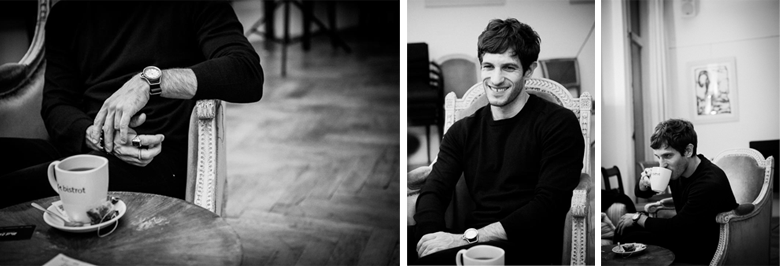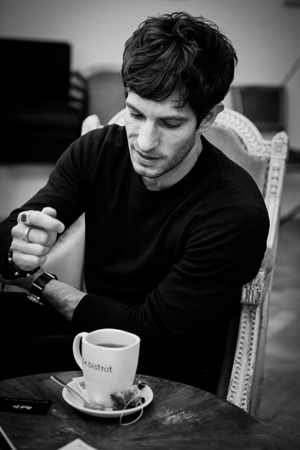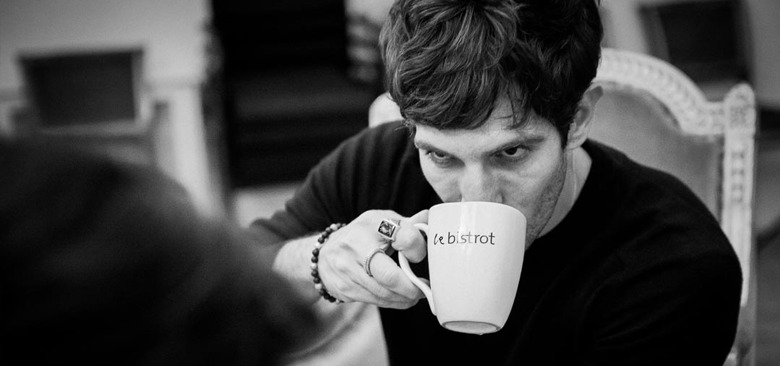Brit Es couldn’t pass up the opportunity to chat to one of our most restless and creative actors. Punctual, good-natured and always charming, we took the opportunity to show our readers some of the keys to his interesting path.
Here at Brit Es, we’re great admirers of Quim Gutiérrez’s work. By the time he was thirteen years old, he was already well-known in Catalonia for his role in the series Poblenou; the rest of us were blown away by his portrayal of Jorge, the protagonist of the feature film Dark Blue Almost Black (Azuloscurocasinegro) (2006), directed by Daniel Sánchez Arévalo. With the same director, who Quim considers a close friend, he also brought us two memorable comedy characters, in the short film Traumalogía (2007) and again, in feature length form, playing Diego in Cousinhood (Primos) (2011). From his CV, we see that he has worked under the direction of José Luis Cuerda and José Luis Garci. Despite the lukewarm reception, we shouldn’t forget his work on the small screen in Génesis, where he played an assassin (2006-07).
2003 was an especially busy year for Quim. He shot four films and launches his own website, www.thejoaquimplacement.com which revealed a creative flair for photography which had, up until then, been hidden from most of the public. That same year, he put himself on the other side of the photographer’s camera to model alongside Amanda Seyfried for Givenchy’s ad campaign, directed by Ricardo Tisci.
The London Spanish Film Festivalhave invited him to their event, where he’s presenting three films: Three Many Weddings (Tres bodas de más), Family United (La gran familia española) and Who Killed Bambi? (¿Quién mató a Bambi?). We wonder if he always goes to the screenings and if he likes seeing himself on the big screen. “I don’t generally have a problem coming to see them, in the end you get used to watching yourself. You go through phases, sometimes you can put up with it, sometimes you can’t.”
Of course, Brit Es couldn’t pass up the opportunity to chat to one of our most restless and creative actors. Punctual, good-natured and always charming, we took the opportunity to show our readers some of the keys to his interesting path.

Fotos © Noela Roibás
So even though we know where we are and why we’ve come here, we can’t help but start this interview by asking you about your photography and modelling. Where did this interest in design, aesthetics and fashion come from? Is it something that you developed once you got involved in the world of cinema, or did it start before that? Yeah, my connection with aesthetics in a global sense goes way back. Furniture and the way people dress have always interested me… I pay close attention to texture – I can remember noticing wood grains, for example. I find it very natural that, at twenty-odd years old, when I finished my studies in humanities, I began to develop my interest by buying decorating and fashion magazines and photography books. Since then I’ve been developing that in its various phases, and today I’m really into aesthetics.
At the moment, I’ve kind of forgotten about the blog because I’m very lazy when it comes to the computer. I like the process of taking photos up until it comes to adding the finishing touches. With touching-up nowadays, you resolve things on the computer, whereas before you had to work with other things – like lighting or make up. It becomes a tool that works in your favour, but I’m very lazy and it wears me out being in front of the computer, fixing and uploading photos…
At first, when you’re filming, as an actor, above all you always try and justify your character. That happens to us a lot, “you aren’t very pleasant”. Well, the character is who he is.
Do you prepare in the same way for a film as you do for a fashion ad campaign? Not at all, in advertising, what you see is what you get! Advertising is very quick; it packs a real punch. It’s more superficial and let’s say, the deeper you can delve into a particular moment, the better.
The experiences you have as an actor must be an advantage in helping you do those rapid changes? Yes, it’s true that fashion advertising is very particular. I did an ad campaign that’s coming out out very soon. I can’t really talk about it, but it’s more than just photos which was the case with the Givenchy one. But there’s something very superficial about it: the position of the hand, the positioning of the body…the public’s interpretation of fashion is very specific.
There are times in editorials when they might ask for more radical acting, when they’ll allow you bigger transformations, but, in general, the key is to have a notable physical awareness and to make sure the way you move is good.

Fotos © Noela Roibás
Let’s move on to talk about the best-known aspect of your life, that is, being an actor. Of the four films you shot in 2013, the only one that wasn’t a comedy, The Last Days (Los últimos días), an interesting science-fiction thriller directed by the brothers, Álex and David Pastor, was not listed in the LSFF selection. Do you think that we are still not used to receiving good sci-fi produced in Spain? I don’t know. Yes, I get the feeling that the public still find it hard to believe that a cast of Spanish actors could pull off a science-fiction film that is as good as an American one. The Last Days is supported by a great script, it has a powerful story, and it’s exciting and well written. The thriller was well-armed. But, despite that, we all imagine that if it were translated into English with a poster full of American or British names, people would go and see it more than they did, and that always frustrates me.
Yes, I do believe there is a certain level of prejudice, but I suppose it’s only with specific genres. Comedy doesn’t have the same problems, but yes, it is true that there is a differentiating factor, which is cash. What we do with a budget of five million, a comfortable budget for a Spanish film, they – the Americans – would do with twenty or thirty. There, we manage to make it look more than it is, and, sincerely, I genuinely believe that the result in the specific case of The Last Days was very successful. I think the fact it wasn’t selected was more down to this prejudice than the film being a failure.
In Family Reunited, you returned to work under the direction of Daniel Sánchez Arévalo. And you return to partner up with Héctor Colomé, Raúl Arévalo and Antonio de la Torre. How was the reunion with the director and the actors? Dani and I are close friends. The problem is that I’m not in Madrid nowadays. This summer, for example, because I’ve been filming in Barcelona, we’ve missed each other a lot. We do loads of things together, we talk practically every day, and shooting a film together is a challenging adventure for us both, because we will do things that we haven’t done before.
That doesn’t happen with Raúl, we are also very good friends, the same with Héctor, because of the generation gap we obviously see less of him, and Antonio de la Torre who is also in the film Family United. It’s a circle that Daniel created from Dark Blue Almost Black and has continued to build up over the years.
For us, reuniting on these projects is a luxury, because Daniel gives us such good stories and I feel that we all strive not to take him for granted. We’re lucky enough to work with a spectacular scriptwriter every x number of years, who also gives us a field of work in which we can explore and try out new things that we won’t have done before – where risks are taken, and being wrong is allowed; and as interesting and creative as that may seem seem, it isn’t as common as it should be. For my part, at least, I try really hard not to take him for granted.
I like good characters. And for the moment, better characters have come my way in cinema than in television. That’s the long and short of it.
The feature film, Family United, brings back memories of Traumalogía, a short film shot in 2007 by the same director and which used some of the same technical and artistic team. How was the experience, considering the story is very similar but in a different context? Did you play the role in the same way as you did in the short, or did you treat Caleb as a completely new character? Caleb’s character is completely new; it’s completely unrelated. It must be said that the film is one of Dani’s stranger comedies and my character isn’t the height of hilarity. In fact, he’s the least funny character, which I like. As early as the first run-through of the script that we did in my house, I told him: “Dani, I get the impression that there isn’t a single joke here. What should we do? Do we force it or leave it as it is?” and we decided that there was no need to force it. If the uncle isn’t funny, that’s who he is.
He’s a somewhat frightening character, something I liked from the very beginning, because his portrayal is that of an arrogant uncle. He’s very sure of himself, so much so that he seems to be allowed to treat others with a certain level of scorn, with a certain superiority above his brothers. Especially with the character of Miquel Fernández. From the beginning of the film until halfway through, he’s a cocky brother who comes from afar and claims to solve everything. He’s a doctor and his father falls ill. Who will come and take charge?…well him of course. But he makes a confession towards the end, which helps us to understand why is he the way he is.
At first, when you’re filming, as an actor, above all you always try and justify your character. And you have to have some level of integrity, maintain the character and not lose the guy for fear of messing up. That happens to us a lot, “you aren’t very pleasant”. Well, the character is who he is.
And do you think that the idea was something that Daniel has held over the years and developed during Family United or was it something new? The idea of using this sense of victory came to him through the cathartic effect of the World Cup final in our country. What would happen if the wedding of one of the brothers was during the final? How would you fit in both things? It was something that was very present in the minds of everyone in Spain, and there was a chance to play with all the confusions that could arise, with two distinct attitudes. I have zero nationalist spirit, but I do understand what Dani was trying to say and I believe it is something real: a generation who has seen Barcelona and Madrid’s best players, and who believed that they could win, against a generation who saw Spain losing and who never saw the get past the quarter finals in their whole history.
This clash coincides with the relationship of the two brothers. That all adds up to the idea of the big family, a big group of brothers, all conflicting in a wedding, but from which emerges comic situations as well as emotional ones. Family stops a lot of things!
I get the feeling that the public still find it hard to believe that a cast of Spanish actors could pull off a science-fiction film that is as good as an American one.
In Three Many Weddings, you meet up with popular figures who we associate with the world of television: Inma Cuesta, Paco León, Berto Romero, Martiño Rivas and yourself launched by the series Poblenou on TV3. Do you miss the small screen? Maybe being a part of a team for more prolonged periods of time, unlike shooting a film, which are only a few intense months or weeks and then you move on to the next project? The truth is, not really. I watch a lot of television, but mostly foreign TV and, as a viewer, I don’t tend to really enjoy the programmes that are produced in Spain. The work rate that television requires can be rather draining, it doesn’t allow very detailed work, asking questions, taking risks, taking things further, but you finish work as rough sketches. Personally it’s not the way I like to work, but I’m not closing any doors.
For me, I prefer good characters in a good series, which allows precise development of a character over a prolonged period of time. The scriptwriters have a lot of time to elaborate the story, they have a lot of time to work with the characters, giving them little nuances and working with audiences.
The problem is that that’s normally cheating in Spain. In general, we move quickly with a lot of chapters, but with a small budget. Basically you have less money, and you have to film more in less time and obviously therefore you have to sacrifice some things. For the moment, I have had the privilege of not having to subject myself to that speed.
Evidently I like good characters. And for the moment, better characters have come my way in cinema than in television. That’s the long and short of it.
– – – – – – – – – – –
Coordinated Interview by: Miriam Rodriguez
Photos © Noela Roibás
[su_note note_color=”#eaeae9″]Translated by Llewelyn Hopwood[/su_note]

